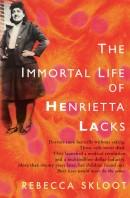 In the 1950s, Henrietta Lacks had cells taken from her cancerous cervix without her knowing. Those cells turned out to be the first to ever grow in culture, and there are “trillions more of [Lacks'] cells growing in laboratories now than there ever were in her body.” Rebecca Skloot’s account of Lacks’ life, as a poor tobacco farmer in Virginia, and her ensuing but anonymous “fame” in the laboratory (her cells known as “HeLa” cells) was 10 years in the making. It’s been getting enough media attention to convince one that maybe books aren’t dying. Any bad karma it may have seems to have landed squarely on its homely cover design. Otherwise, this is one blessed book. The Boston Globe starts us out nice and easy: “a well-written, carefully-researched, complex saga of medical research, bioethics, and race in America.” Jerry Coyne raises the volume, calling the book “a modern classic of science writing.” Add the New York Times and you have a deafening roar: “[O]ne of the most graceful and moving nonfiction books I’ve read in a very long time. . . . floods over you like a narrative dam break . . . [Skloot] writes about Henrietta Lacks and her impact on modern medicine from almost every conceivable angle and manages to make all of them fascinating.” And then science blogger “Dr. Isis” just loses it: “This is, without a doubt, the single best piece of non-fiction I have ever read. It is one of the most important stories of the last 100 years and should be required reading for every scientist and physician-in-training.”
In the 1950s, Henrietta Lacks had cells taken from her cancerous cervix without her knowing. Those cells turned out to be the first to ever grow in culture, and there are “trillions more of [Lacks'] cells growing in laboratories now than there ever were in her body.” Rebecca Skloot’s account of Lacks’ life, as a poor tobacco farmer in Virginia, and her ensuing but anonymous “fame” in the laboratory (her cells known as “HeLa” cells) was 10 years in the making. It’s been getting enough media attention to convince one that maybe books aren’t dying. Any bad karma it may have seems to have landed squarely on its homely cover design. Otherwise, this is one blessed book. The Boston Globe starts us out nice and easy: “a well-written, carefully-researched, complex saga of medical research, bioethics, and race in America.” Jerry Coyne raises the volume, calling the book “a modern classic of science writing.” Add the New York Times and you have a deafening roar: “[O]ne of the most graceful and moving nonfiction books I’ve read in a very long time. . . . floods over you like a narrative dam break . . . [Skloot] writes about Henrietta Lacks and her impact on modern medicine from almost every conceivable angle and manages to make all of them fascinating.” And then science blogger “Dr. Isis” just loses it: “This is, without a doubt, the single best piece of non-fiction I have ever read. It is one of the most important stories of the last 100 years and should be required reading for every scientist and physician-in-training.”
The Immortal Life of Henrietta Lacks by Rebecca Skloot
Crown, 384 pp., $26.00

